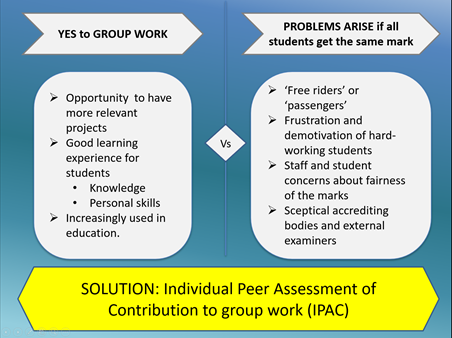About IPAC
Individual Peer Assessed Contribution (IPAC) to group work can be assessed through the use of this IPAC tool. But what is IPAC and why should we use it?
What is IPAC?
IPAC stands for Individual Peer Assessed Contribution to group work.
The IPAC assessment methodology is a way of assessing students when doing group work such that their individual contributions as valued by their peers are considered. It is not a new practice, in fact it is being used in one way or another in many HE institutions already and reported in the literature. The UCL IPAC system is a software + LTI developed at UCL that allows staff to run the IPAC methodology very easily, with minimal administration burden, great capability for customization, and other relevant features. It also helps to extend the focus from only “fair assessment of the students” to “providing training and feedback to students” particularly in giving and receiving peer feedback and improving how they work in teams. See more about the UCL IPAC system on Menu > IPAC system > General structure.
Why is the IPAC assessment methodology needed?
IPAC is the methodology to assess group work where an element of 'individual peer assessed contribution' is combined with the group mark to provide individual marks. It is used to address concern about the fairness of group assessment, which can consequently damage the student's experience during the module. The aim of this methodology is to provide students with an individual mark that is based on their contribution, rather than all members getting the same group mark. This helps to promote student engagement and tackle associated problems.

The benefits of using the IPAC assessment methodology are:
- Fairer marks for individuals
- Encourages students’ engagement and professional behaviour during group work
- Fairer marks for individuals
- Encourages self-reflection
- Welcomed by students, leading to less complaints to tutors and less stress
- Students practice giving constructive and professional feedback
- Insightful feedback: Students learn how their contribution is perceived within the group, and can improve accordingly
- Tutors get a better understanding of the group dynamics at their convenience, e.g. start, during and/or end of the project
IPAC Consortium
Staff across UCL from different Faculties and disciplines shared concerns about the traditional way in which the group work was assessed, and also experienced similar problems. The UCL IPAC Consortium was formed in April 2015 by Dr. Pilar Garcia Souto, reaching a membership of over 60 staff from 20 different UCL departments. The core team of the UCL IPAC Consortium investigated the IPAC methodology, the different variants in which it could be run in the classroom and what could be recommended as the best practice.
The IPAC Consortium also reviewed several existing open-source & commercial pieces of software that could be used to implement the IPAC methodology, but did not find one suitable for the established key requirements.
This led Dr. Pilar Garcia Souto to design and develop what now we know as the UCL IPAC system via a series of UCL-funded projects.